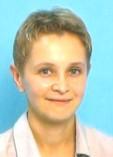Stoliarova, lga | Russia

lga Stoliarova was born in Moscow, Russia, in 1970. In 1995 she received her M.A. in Russian State University for Humanities (Moscow): Department of the History and Theory of Culture (major in Comparative Studies of World Religions, minor in Philosophy). From 1995 she was a postgraduate at Department of Modern Western Philosophy in Institute of Philosophy, The Russian Academy of Science (Moscow). She worked on her PhD thesis devoted to phenomenological approaches to science and technology. In 2000 she defended the thesis and got her doctoral degree (Candidate of Science). Since 1999 she is a researcher at Department of Philosophy in Institute of Scientific Information for Social Sciences, Russian Academy of Sciences (INION), Moscow.
Latter years her interests are concentrated on philosophy and sociology of science, postmodern approaches to science and technology, theories of science in cultural context, symmetries, and concepts of hybrid reality.
From 2001 she has been lecturing at Department of Management in Moscow State University (Chair of Philosophy and Methodology of Science). She teaches history of philosophy to natural science students. At the same time she prepared an introductory course on science and technology studies for Department of Philosophy in Moscow State University (Chair of Philosophy of Science) that was announced and approved at the end of 2001. Now she also keeps on working at the course that is supposed to start on her return.
In 2001 she participated in Seminar 'Science, Technology and Technoscience in a Hermeneutic Perspective' (Hungary, Budapest, Eötvös University, Department of History and Philosophy of Science. June, 10 -14) under the grant of Russian State Foundation for Humanities.
Since October 2002 she is a Fellow at the Institute for Advanced Studies on Science, Technology and Society, Graz.
Now she is working on the project that she supposes to develop into her habilitation (Doctor of Science).
Project at IAS-STS: Social constructivism: an ontological turn (analysis of some trends of postmodern philosophy and sociology of science by the example of "symmetries")
The project presupposes to consider "symmetries" as an example of wider trend of postmodern thought that is often being identified as a turn towards ontology. It means that philosophy appeals to such ways of thinking which may be in a certain sense called pre-Kantian. In other words it becomes urgent again to ask not only about subject's constructions of the world but also about what the world (and subjectivity as one of its components) is in itself.
Symmetries are one of the latest results of postpositivistic concepts of philosophy of science and sociology of science and technology (STS). They mean that both humans and nonhumans are considered to be equally actants participating in creation of scientific facts and the world. This point of view opens the social sciences to material world which was on that side of a barricade before.
Symmetries originally come from ANT (M. Callon, B. Latour, J. Law, M. Lynch, S. Woolgar) but there are also those lying beyond ANT (D.Haraway, A.Pickering and others). I am interested in various sorts of symmetries arising as a self-criticism of social sciences directed towards the very foundations of the discipline.
Symmetries express a tendency to avoid dictates of modern subject and to return to "things in themselves". I think that it is not true to interpret this appeal to things like a return to 'naive objectivism' or physical reductionism. I believe that novelty of these postmodern strategies may be found in revision of the very idea of object which gets human-like characteristics: it is considered to be multi-dimensional, unstable, open, historically developing etc One can observe a certain interchange of nature and culture in a process of naturalization of social sciences and humanization of natural sciences. Relational ontology that comes from here is expressed by the term 'collective' coming from current STS writings. This notion says about hybrid reality which is forming due to joint efforts of humans and nonhumans.
There is a point of view stated among others by Russian scholars (R.Karpinskaja, I.Liseev, A.Ogurtsov) that hybrid concepts i.e. those in which one can find transitions from reflection on nature to reflection on human being and vice versa arise in natural sciences (the authors refer to synergetic, sociobiology, bio-politics). As regards social sciences they still keep their adherence to a subjective perspective.
From my point of view the concepts which these Russian scholars are looking for in social sciences are the very STS symmetries turning social sciences towards natural sciences.
"New paradigm of natural sciences", - above-mentioned Russian scholars write, - which is nowadays forming takes into account human-like characteristics of its objects. Then, I believe, STS symmetries may be considered as an appropriate response of social sciences to our present situation of synthesis of "two cultures" (using C. Snow's vocabulary).
Selected Publications
1. "Husserl on Descartes", Journal of the History of Philosophy (Moscow: Institute of Philosophy of Russia Academy of Sciences) 1998, No. 3: 76-92
2. "Don Ihde's Instrumental Realism", Journal of History of Philosophy (Moscow: Institute of Philosophy of Russian Academy of Sciences) 2000, No 5: 113-138
3. " 'Cyborg Identities' (Aarhus, Denmark, October 21-22, 1999): Review of materials of the conference", Referative Journal 'Social Sciences and Humanities', Seria 3: 'Philosophy' (Moscow: Institute of Scientific Information in Social Sciences of Russian Academy of Sciences) 2000, No 2: 45-63
4. "Postnonclassical image of science: Technoscience studies (analytical review)", Philosophy in 20th century: Collection of reviews and synopses. Parts 1-2. (Moscow: Institute of Scientific Information in Social Sciences of Russian Academy of Sciences) Part 2. forthcoming (2002)
5. "Social constructivism: An ontological turn", Bulletin of Moscow State University, Seria 'Philosophy'
(Moscow) forthcoming (2003, No 3).
6. "Latour, B. When things strike back: a possible contribution of 'science studies' to the social sciences: Translation from English, comments", Bulletin of Moscow State University, Seria 'Philosophy' (Moscow) forthcoming (2003, No 3).
